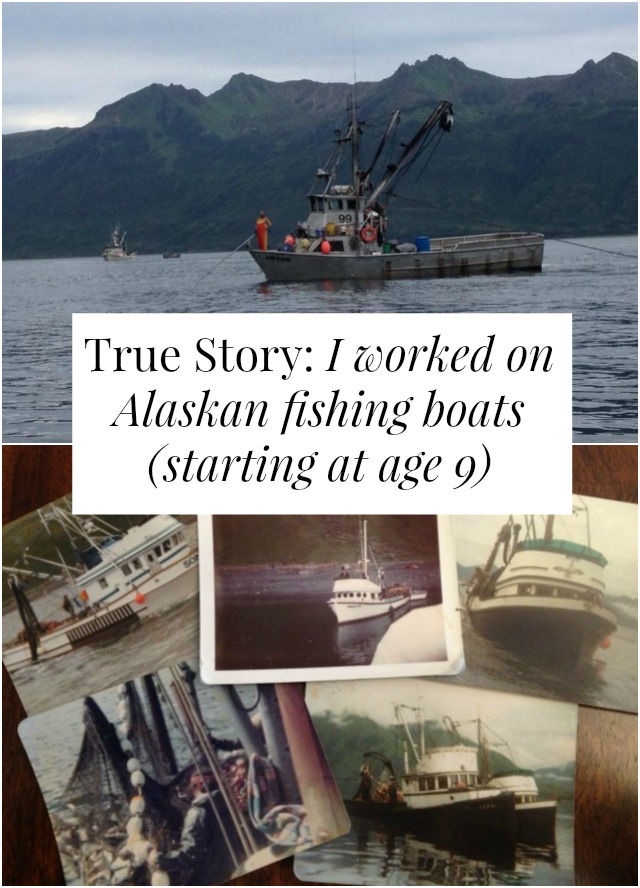
Top photo: the FV Awtam that Ron worked on at age 9. Bottom photo: various boats Ron has worked on.
If you love The Deadliest Catch or have a healthy sense of adventure, this is for you. Today, my cousin-in-law (is that a thing?) tells us how he started working at 9 years old, what happens when the fish are running, and what you do if the is captain passed out at the wheel and crashes the boat. Ahhhhh!
Tell us a bit about yourself!
My name is Ron and I’m a 37-year-old Alaska Native. I was raised in the Alutiiq village of Old Harbor, AK. Old Harbor is a small fishing village on Kodiak Island only accessible by plane or boat and has a population of around 300 people. I moved to the city (Anchorage) at 19.
I work as traffic agent for a local airline and in my free time, I like to play hockey, ride my mountain bike, spoil my pets, and cook for my wife.
When did you first work on a fishing boat?
In Old Harbor, everyone was involved in fishing. I started on my dad’s salmon boat when I was 5 years old and “helped out” part time.
By 7, I was I was plunging by myself every summer. Plungers take a 10’ long metal pole with a cup attached at the end and plunge it into the water to scare fish away from the boat and into the net.
My first official paying job was when I was 9, working for my brother, who was 19, on the FV Awtam as a net stacker. My brother as the captain, my dad as the skiff man, and my two cousins were deckhands. At the ripe old age of 11, I was a cork stacker for our neighbor. I made a name for myself as a hard worker and got better jobs on bigger boats until I was 19.
What sort of skills do you need to work on an Alaskan fishing boat?
You need a strong back, a set of sea-legs, common sense, and a go-getter work ethic. You also need to be able to live in cramped quarters for extended periods of time. You need to be able to function on little sleep and be okay with not showering for days at a time. And don’t forget that you need to be able to put up with that rotten fish smell!
Tell us about an average day on the job.
Work starts between 3-5am and does not stop until 12 am, depending on the fish. You wake up to a blaring alarm to pull the anchor and it’s time to start fishing for the day. You rapidly drink coffee that brewed overnight and get ready to set the net.
The setting of the net happens quickly and the net is held open in position for about 30 minutes. Then the net, full of fish, is loaded onto the deck and all fish go into the fish hold. Next the deck is cleaned and we repeat the whole process starting with the setting the net. The entire process takes about an hour and if the fish are running you won’t take a break longer than two minutes to grab food.
We ate mostly non-perishable items; spam, bacon, hash, cartons of milk, lots canned foods, soda, chips, and soups. We also ate a lot of fish straight from the fish hold, mostly salmon, some halibut. If we had to deliver our fish to a tender then we would stop fishing around 9 pm and get in line to off-load our fish. If not, we’d fish until 11 pm – that when the fish typically stop running. We’d anchor up, prep for the next day, eat a little more, and get to sleep as fast as we could. Depending on the type of fish we were targeting we could be out at sea for three to ~30 days.
You worked on these boats long before Deadliest Catch became a reality tv show phenomenon.
It’s a good show! They fish for crab, which I’ve never fished and I only fished in the summer, but from what I can tell it is a fairly good representation of the job. But they do tend to ham everything up for the cameras I think. I have met quite a few of the “stars” of the show through my current job in the airline industry and they seem like typical Alaskan fishermen.
In terms of safety, did you ever have any close calls?
Yes! One day, while taking a nap in my bunk I woke to a huge noise and was tossed from my bed. Our captain passed out at the wheel and we veered into a rock outcropping at cruising speed. Our bow smashed into the rocks, was up at a 35-degree angle, and our stern was just under water.
We were taking on water from holes in the bow and in the stern and we had to get off the rocks or risk sinking stern first. Using the skiff we were able to dislodge the boat from the rocks only then to realize we were sinking. We raced at full speed towards the nearest beach to beach the boat. The whole process, from hitting the rocks to the beach, was 45 of the longest minutes of my life. A nearby tender boat picked us up and helped patch up the boat enough to make it back to Kodiak.
Even though you were fishing for salmon and halibut I’m sure you caught lots of other things in your nets. What were some of the strangest things you brought in?
The weirdest things we caught were harbor seals, skates, puffer fish, and salmon sharks. Harbor seals gorged themselves on the free fish dinner until we brought the net on board where they ended up on the deck and jumped back into the water. We also had orcas and humpbacks sail through our nets ripping them with ease.
How much money can someone make working on these boats?
The pay varies from year to year based on the amount of fish caught, the price per pound, and your job on the boat. As a 9-year-old I made $5,000 for three months of work. After that summer, the pay would be about $12,000 to $15,000.
The summer when I was 17, I made $20,000 salmon fishing, $5,000 for herring fishing, and $4,400 for 3 days (!) of work for halibut. I used some of that money for living expenses while I was away at boarding school in Sitka, AK and to help my family. Now as an adult, I wish I had saved more of that money!
You don’t work on the boats anymore. Why not?
It was a part of my youth, it was the “family business”, but I wanted something different for myself. I knew I wanted to get out of the village and this meant breaking the bond with the ocean. Everyone who still lives in Old Harbor is a fisherman and I knew I didn’t want to be one all my life. It can be a very, very hard life with many ups and downs. The paychecks can be huge but it can also be inconsistent work and it’s a young man’s game.
Would you ever encourage people to work on the boats?
I would say go do it for a summer or two for an extreme Alaskan adventure but not for a career. You cannot beat the scenery or the experience but the market is too unstable to have this as your only source of income.
Currently, two of my nephews fish while on summer break from high school and college. For my nephews, who live outside of Alaska, it is a great way for them to stay connected to their roots and make money for college. I definitely wouldn’t change my experience growing up on fishing boats!
Thanks so much for sharing your story, Ron – this was fascinating! Do you guys have any questions for him?
P.S. More daring interviews with a woman who lives in a haunted house, a woman who lives + works on an oil rig, and an ultra marathoner.












Is this something women also do or is it kind of a men only thing? I think it sounds really cool! I might want to try it one of these days!
Yes! Woman can do this work. I worked with 2 women when I was fishing. Both were just as hard working as everyone else. It is no walk in the park, but worth the experience.
Oh wow, this was so interesting! I do love The Deadliest Catch, so it was interesting to read an interview with someone else in that industry. Thanks so much for sharing Ron!